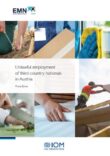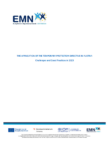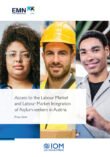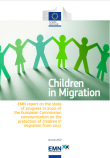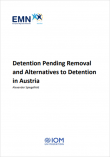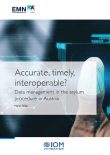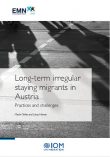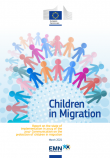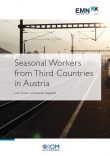The National Contact Points of the European Migration Network (EMN) prepare several studies on migration and asylum-related issues each year based on common study template. EMN studies are elaborated in accordance with uniform specifications in order to achieve comparable results EU-wide. With the help of an external service provider, the European Commission publishes a Synthesis Report summarizing the main findings from the studies prepared by the National Contact Points.
EMN Study: Unlawful Employment of Third-Country Nationals in Austria
This study examines the unlawful employment of third-country nationals in Austria in the period from 2017 to 2023. It provides an overview of risk areas and current trends, and analyses of measures to prevent and identify unlawful employment. The study also discusses possible consequences for employers and third-country nationals. Based on statistics, expert interviews, and analyses of policies, laws and practices, key challenges and good practices are highlighted.
EMN Study “The Application of the Temporary Protection Directive in Austria – Challenges and Good Practices in 2023”
The Russian war of aggression against Ukraine, which began in February 2022, triggered the fastest and largest displacement in Europe since the Second World War. Countless people left Ukraine as a result of the war to seek protection and safety in neighboring countries as well as other countries. In Austria, too, a number of measures were taken to provide protection and care for the large number of displaced Ukrainians. The publication "Displaced persons from Ukraine – summarizing overview of Austrian measures in the period February 2022 to June 2023" provides a compact insight into these measures and developments. It is based on the Annual Report on Migration and Asylum 2022 and the Austrian contribution to the EMN study "The Application of the Temporary Protection Directive – Challenges and Good Practices in 2023".
Note: The report "Displaced persons from Ukraine – summarizing overview of Austrian measures in the period February 2022 to June 2023" will be published here shortly.
EMN Study “Access to the Labour Market and Labour Market Integration of Asylum-seekers in Austria”
The study deals with access to the labour market and labour market integration of asylum-seekers in Austria. First, it addresses the timing and requirements for access to employment and self-employment. Second, it deals with laws, policies and measures to ensure that access to the labour market, if granted, can actually take place. Based on statistics, expert interviews, and analyses, key challenges and possible solutions are highlighted.
EMN Study “Trafficked Third-Country Nationals: Detection, Identification and Protection in Austria”
This study deals with the phenomenon of human trafficking of third-country nationals in Austria. In Austria, the fight against human trafficking is a domestic as well as foreign policy priority of the federal government. The report therefore examines Austrian measures to help detect trafficking situations and protect trafficked persons. In addition, the report provides a statistical overview and also addresses challenges and best practices.
EMN-Report: Children in Migration
This EMN-report highlights Member States' progress in implementing the EU Communication on the Protection Children in Migration. The 2017 Communication sets out measures to strengthen the protection of children at all stages of migration at national and EU level. The report focuses on progress in 2020 in areas such as identification, accommodation and procedural safeguards.
EMN Study “Detention Pending Removal and Alternatives to Detention in Austria”
This study sheds light on detention pending removal and alternatives to detention in Austria. In Austria, detention pending removal can only be imposed on individuals where the purpose of detention (i.e. securing the procedure for issuing a measure to terminate a residence permit) cannot be achieved by means of an alternative. The brief report explains the legal basis for the alternatives, analyzes current statistics, and addresses benefits as well as challenges. It also looks at health care, support services, consideration of vulnerable groups, and the complaint process.
EMN Study “Accurate, timely, interoperable? Data management in the asylum procedure”
This study focuses on the types of data that are collected on asylum seekers in Austria, from the moment when an application is lodged and until a first-instance decision is issued, and how the data are managed. Recent developments and trends relating to data management are described and the challenges and good practices that have previously emerged in Austria in the area of data collection and management are discussed.
EMN Study “Long-term irregular staying migrants in Austria. Practices and challenges”
This study sheds light on the phenomenon of long-term irregular staying persons in Austria. Even though the topic of irregular migration regularly recurs in political and media debates, Austrian policymakers only have selectively focussed on the issue. The report examines the approaches taken by the responsible authorities to avoid and mitigate situations of irregularity and the social consequences for the third-country nationals concerned. In addition, the measures taken for irregular staying persons in relation to the COVID-19-pandemic are analyzed.
EMN-Report: Children in Migration
This EMN-report highlights Member States' progress in implementing the EU Communication on the Protection Children in Migration. The 2017 Communication sets out measures to strengthen the protection of children at all stages of migration at national and EU level. The report focuses on progress in 2019 in areas such as identification, accommodation and procedural safeguards.
EMN Study: Seasonal Workers from Third Countries in Austria
This study provides an overview of Austria’s experience with the admission and employment of seasonal workers from third countries since 2016. The first part of the study describes in detail the Austrian seasonal workers model and related data. The study begins with the question of the extent to which seasonal workers are needed to meet Austria’s labour demands. The second part describes the rights and duties of seasonal and harvest workers, while also discussing the corresponding means of upholding and implementing these in Austria. In view of the current situation, the study finally addresses the impact of the COVID-19 pandemic on the employment of seasonal workers from third countries.


